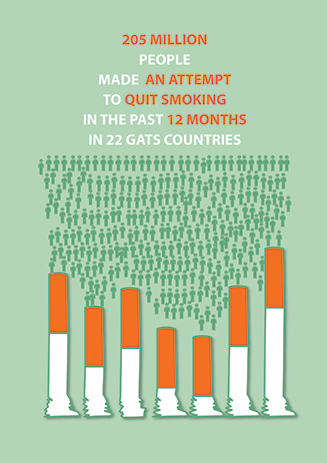You are here
World No Tobacco Day
 Infectious and chronic diseases take a tremendous toll on the world’s population, but none has a greater effect than tobacco use, which represents the leading cause of death and disease in the world. Sunday, May 31, marks World No Tobacco Day. It is a day designated by the World Health Organization (WHO) and its partners to highlight the health risks associated with tobacco use and advocate for legal and economic policies to reduce tobacco consumption.
Infectious and chronic diseases take a tremendous toll on the world’s population, but none has a greater effect than tobacco use, which represents the leading cause of death and disease in the world. Sunday, May 31, marks World No Tobacco Day. It is a day designated by the World Health Organization (WHO) and its partners to highlight the health risks associated with tobacco use and advocate for legal and economic policies to reduce tobacco consumption.
To inform tobacco use research and policy formulation, the CDC Foundation along with the U.S. Centers for Disease Control and Prevention (CDC), the World Health Organization and the World Lung Foundation today released The GATS Atlas, which presents tobacco use statistics drawn from the Global Adult Tobacco Survey (GATS).
 The GATS Atlas highlights findings from 22 GATS countries in a user-friendly, visual format and incorporates data covering nearly 60 percent of the world’s population. Data illustrated in The GATS Atlas includes information on monitoring and use of tobacco, efforts to reduce secondhand smoke prevalence, tobacco price and tax information, highlights of regional and country specific tobacco use trends from low- and middle-income countries and a section that tracks progress to reduce tobacco use. In the 22 countries presented in the Atlas, 688 million people smoke tobacco and the average age of initiation is under 20 years.
The GATS Atlas highlights findings from 22 GATS countries in a user-friendly, visual format and incorporates data covering nearly 60 percent of the world’s population. Data illustrated in The GATS Atlas includes information on monitoring and use of tobacco, efforts to reduce secondhand smoke prevalence, tobacco price and tax information, highlights of regional and country specific tobacco use trends from low- and middle-income countries and a section that tracks progress to reduce tobacco use. In the 22 countries presented in the Atlas, 688 million people smoke tobacco and the average age of initiation is under 20 years.
GATS, which is supported in part by the Bloomberg Initiative to Reduce Tobacco Use and the Bill & Melinda Gates Foundation, is a nationally representative household survey of adults aged 15 years and older. The survey systematically monitors adult tobacco use and tracks key tobacco control indicators using standardized methodology across all countries to generate comparable data within and across countries.
Monitoring the tobacco epidemic through the implementation of GATS represents a critical component of a comprehensive tobacco control program. Data collected through GATS provides stakeholders with scientific information to overcome challenges in developing, implementing and evaluating effective national tobacco control policies and programs. At the CDC Foundation, we are pleased to have a role in helping to facilitate this vital work.
